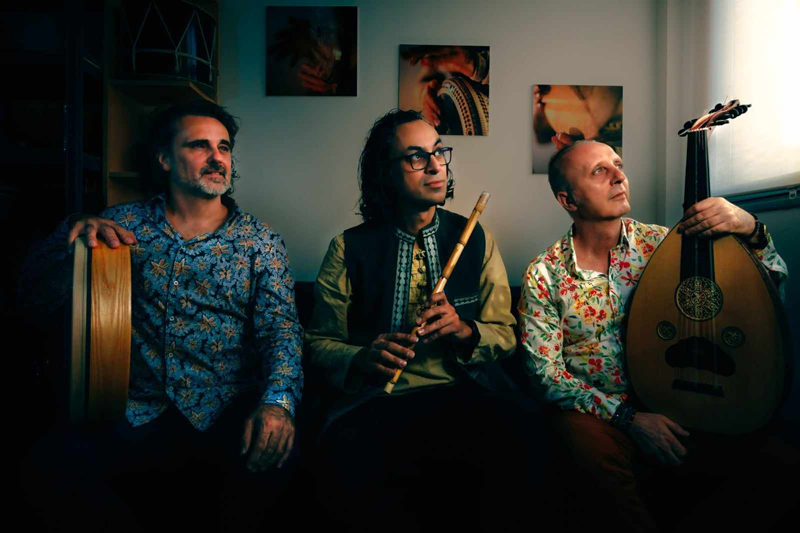Cardamom Trio is a new project consisting of Kaveh Sarvarian, a composer and musician of Iranian origin (ney, percussion, vocals); Hames Bitar, a Syrian oud player; and the Spanish percussionist specializing in Middle Eastern percussion, Luis Taberna.
After a process of artistic creation and a joint trajectory in other projects, mainly Darawish, a more multitudinous band, with which they released the album Madar in 2020, Hames and Kaveh have composed and produced an album called When the Sun Rises (available in the main digital platforms). And very recently, they have shaped this new project, this trio, in which they have incorporated Luis, also an old companion in many ventures. The interview is primarily answered by Hames, although I have asked for a response from each of them for some questions. This is the first interview they have done since this trio was born, and I feel very honored to share it with the readers of World Music Central. I hope you find it very interesting.
Araceli Tzigane: Cardamom Trio has just been born as such with this name, but you really have a previous trajectory, both separately and together. Please explain to us the roots of this project.
Hames Bitar: We have been working for many years on different projects, the last one being Darawish, which was a space for each one to compose a theme, and the arrangements were made among all. There was a rehearsal day when the others were going to arrive late, so we decided the three of us to improvise and play something in the meantime. This is how the Persarab theme came out, which was the only theme composed by the three of us, so, over time, rehearsals, and encounters over the years, the idea of doing a project with this philosophy has been born, which is group work, to find a path that unites all our experiences.
AT: So, Cardamom Trio consists of Kaveh Sarvarian, an artist of Iranian origin who plays ney, percussion, and sometimes sings; you, Hames, with the oud; and Luis Taberna on percussion. Kaveh and you have created the pieces, which are all original compositions. You come from two musical traditions that, perhaps to the more inexperienced, may seem very close, which are the Persian and Arab traditions, respectively. They are two modal music traditions, but they are different. What differences are there, and what main meeting points are there? In each piece, do you use only one of the traditions, or do you mix them at some moments? If you mix them, how is it achieved?
HB: Persian and Arab music are two sister musics; the meeting point may be the modes (maqams). In fact, many Arab modes have Persian names, such as Nahawand or Rast, but the rhythms are different in structure and in the way of playing. The way of singing, the ways of making ornaments are quite different; they share a common spirit but with two different languages.
The starting point was the rhythms, composing a melodic structure on an Arab rhythm. We got together and worked together to develop it. Kaveh, besides being a great musician, is also a composer and arranger. In this way, a working dynamic was born that took the themes to a new context that we did not expect before.
AT: Still, I imagine this must have taken you quite some time… How has that process been, how long have you been working on what has finally materialized in this album “When the Sun Rises”?
HB: We have been talking and trying things since 2019. At the end of that year, we started recording the ideas. In 2020, after seeing that there were three solid themes and that we could continue on this path, that’s when we decided to record the album. We worked slowly and without pause until the album came out in 2023.
AT: What do you think marks your difference or uniqueness in the world of music?
HB: I think our most important feature is based on our traditions, using traditional instruments, while also employing composition techniques and influences from other Western music that we absorb over time. We feel free to experiment with anything we feel like.
AT: Does being in Spain, where we also have a very strong and specific musical personality, affect your artistic work in any way?
HB: Spain helped me to rediscover Arabic music, which I had abandoned in adolescence. In Spain, I felt the strength of the Arab musical tradition, so there were many years of working on classical or Andalusian Arab music projects until it came When the Sun Raises. At the same time, the weight of the Arab tradition has pushed me to find myself as a musician; it is time to express myself as a musician.
AT: What are you working on now?
HB: Now we are working to consolidate our work on social media, have our own website, and prepare all the necessary material for dissemination, and of course, continue rehearsing, where ideas for live performances also arise.
AT: This question is for all three of you. If each of you could choose an artist to collaborate with, who would it be? It can be alive or dead.
HB: If I could choose, I would choose the guitarist Manolo Sanlúcar. I listened to his album Tauromagia in Damascus in 1990, and it has enchanted me for the strength and delicacy of his music. His fidelity to pure art has not prevented him from knocking on the doors of the avant-garde. I was lucky to attend one of his master classes in Córdoba.
Kaveh Sarvarian: For me, Efrén López.
Luis Taberna: I would love to have the opportunity to play or collaborate with the guitarist and specialist in ancient string instruments, Enrike Solinís.


